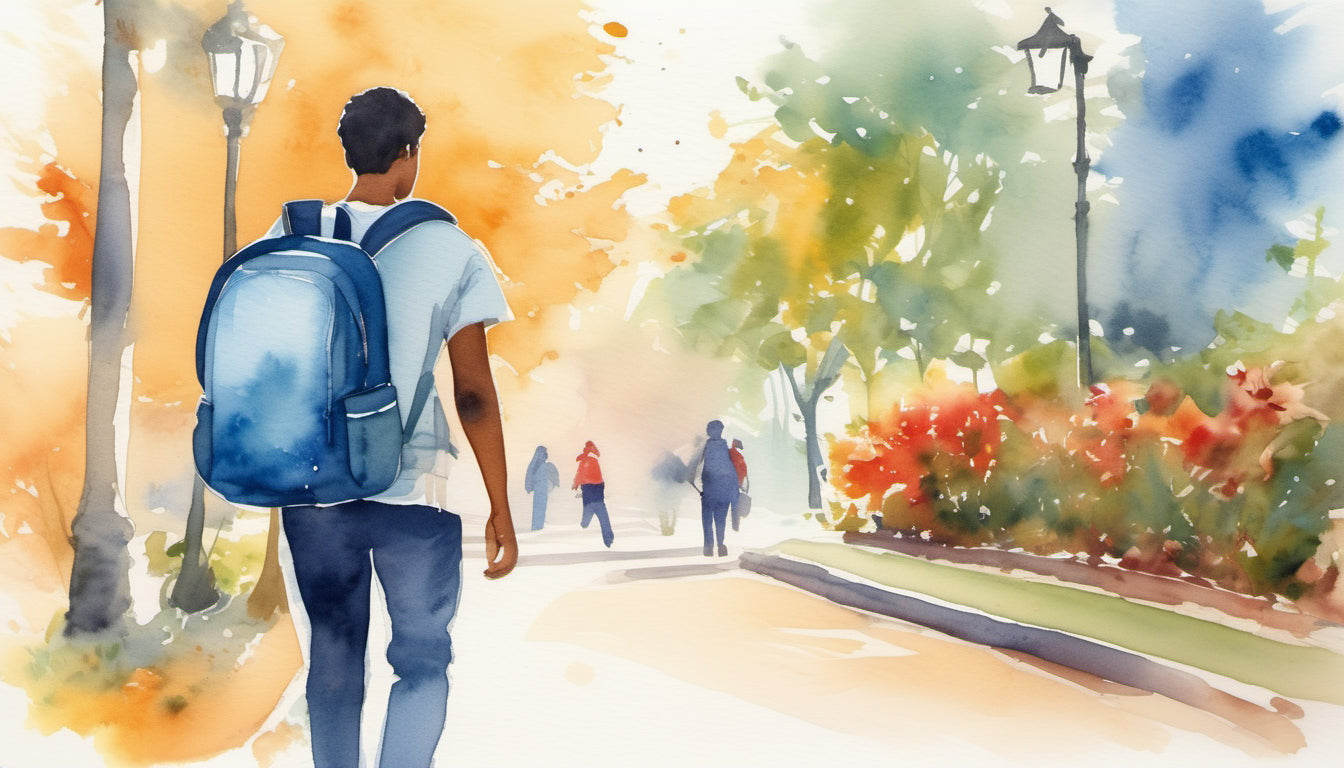College is an exciting time in a person's life. It's a time of growth, learning, and new experiences. But along with all the fun and opportunity, it's important to prioritize personal safety. As a college student, you're entering into a new environment, surrounded by peers and navigating a campus filled with various risks and challenges. By being aware of potential dangers and taking proactive measures, you can significantly reduce your vulnerability and enjoy a safe and secure college experience.
In this comprehensive guide, we will explore various personal safety measures that you can implement to protect yourself on and off-campus. From securing your living space to safeguarding your personal belongings, from maintaining personal safety on campus to digital safety and cybersecurity, we will cover a wide range of topics to ensure your well-being. Additionally, we'll discuss self-defense techniques, alcohol and substance abuse safety, and building support systems to create a holistic approach to personal safety during your college years.
It's important to note that personal safety is not about living in fear or becoming paranoid. Instead, it's about being prepared and informed so that you can confidently navigate your college experience while minimizing risks. Remember, your safety is of paramount importance, and taking these precautions will provide you with peace of mind and a solid foundation to thrive academically, socially, and personally.
Let's dive into this guide and empower you to make informed decisions that prioritize your personal safety!
Understanding the Importance of Personal Safety
When it comes to personal safety, it's crucial for college students to be aware of the potential risks they may encounter and take proactive measures to protect themselves. As exciting as the college experience can be, it's also important to prioritize your safety and well-being. By understanding the importance of personal safety, you can create a safe environment for yourself and enjoy your college years to the fullest.
Here are a few key aspects of personal safety that every college student should be aware of:
Awareness of Potential Risks
Being aware of your surroundings and the potential risks is the first step in personal safety. This includes understanding the crime statistics in your college campus and surrounding area, as well as being informed about any recent incidents or security alerts.
Creating a Safety Plan
Having a safety plan in place can help you respond quickly and appropriately in emergency situations. Identify safe places on campus, memorize emergency contact numbers, and have a plan for how to communicate with your friends and family during emergencies.
Knowing Your Campus Resources
One of the most valuable resources for personal safety on campus is the security department or campus police. Take the time to familiarize yourself with their services, such as emergency call boxes, campus escorts, and safety apps. Additionally, many colleges offer self-defense classes or workshops that can empower you with the skills you need to protect yourself.
Remember, personal safety is not about living in fear, but about being prepared and taking precautions to minimize risks. By understanding the importance of personal safety, you can make informed decisions and create a safe environment for yourself in college. Stay tuned for the next section on securing your living space, where we'll explore measures to protect your dorm or apartment.
Securing Your Living Space
One of the top priorities when it comes to personal safety as a college student is securing your living space. Whether you live in a dormitory, apartment, or off-campus housing, taking the necessary precautions to ensure your safety is crucial. Here are some key steps you can take to secure your living space:
Choosing a Safe and Secure Housing
- Research the neighborhood: Before signing a lease or choosing a place to live, research the neighborhood to determine its safety level. Look for areas that have low crime rates and are well-lit and well-maintained.
- Consider security features: When looking for housing, pay attention to the security features available. Look for buildings or complexes that have secure entry systems, surveillance cameras, and well-lit common areas. These features can act as deterrents to potential criminals.
- Check the locks: Ensure that all doors and windows in your living space have sturdy locks. If necessary, request the landlord to install stronger locks or consider upgrading them yourself.
Implementing Home Security Measures
- Install a security system: Consider investing in a security system for your living space. This can include burglar alarms, motion sensors, and security cameras. These systems provide an added layer of protection and can help deter burglars.
- Use timers for lights: When you're away from your living space, use timers to turn on lights at different times. This gives the impression that someone is home, deterring potential burglars.
- Get to know your neighbors: Establish a friendly relationship with your neighbors. They can keep an eye on your living space when you're away and notify you or the authorities if they notice any suspicious activities.
Fire Safety Precautions
- Install smoke detectors: Ensure that your living space is equipped with working smoke detectors. Test them regularly to make sure they are functioning properly.
- Have a fire escape plan: Familiarize yourself with the evacuation routes and fire escape plan for your building. Practice drills regularly with your roommates or neighbors to ensure everyone knows what to do in case of a fire.
- Avoid fire hazards: Do not overload electrical outlets and avoid using multiple extension cords. Keep flammable items away from heat sources, such as candles or space heaters. It's also important to never leave cooking unattended.
By taking these steps to secure your living space, you can significantly reduce the risk of burglary or fire incidents. Remember, personal safety is a priority, and it's important to be proactive in implementing these measures.
Protecting Valuables and Personal Belongings
One of the key concerns when it comes to personal safety for college students is the protection of their valuables and personal belongings. As a college student, you likely have expensive items such as electronics, textbooks, and personal identification documents that are important to your daily life. Here are some essential tips on how to secure your valuables and personal belongings:
Securing Electronics and Devices
- Use strong passwords for your laptops, tablets, and mobile devices. Avoid using easily guessable passwords like your birthdate or "123456." Opt for a combination of letters, numbers, and special characters for added security.
- Install tracking apps on your smartphones, tablets, and laptops. These apps can help you locate your devices in case they are lost or stolen.
- Keep your devices out of sight when you're not using them. Avoid leaving them unattended in public spaces or unlocked cars.
- Record the serial numbers of your electronic devices and store them in a secure location. In case of theft, this information will be helpful for filing a police report and insurance claims.
- Avoid lending your devices to strangers or leaving them in common areas, such as libraries or study rooms.
Preventing Theft and Burglary
- Lock your doors and windows whenever you leave your dorm room or apartment. This simple act can deter burglars and prevent unauthorized access.
- Invest in a sturdy lock for your dorm room or apartment door. Choose a lock that is difficult to pick or break.
- Don't leave your belongings unattended in public spaces, such as libraries, cafes, or common areas. Always keep an eye on your bags, laptops, and other valuable items.
- Keep your valuables out of sight when you're in public. Avoid flashy displays of expensive items that might attract potential thieves.
- Consider purchasing renter's insurance to protect your belongings in case of theft or damage. Renter's insurance can provide financial coverage for the replacement or repair of your personal belongings.
Safety of Identification Documents
- Keep your identification documents secure in a locked drawer or safe. This includes your passport, driver's license, social security card, and any other important identification documents.
- Make copies of your identification documents and store them in a separate location. This will come in handy if your original documents are lost or stolen.
- Avoid carrying unnecessary identification documents with you on campus. Only carry what is necessary for your daily activities.
- Never share your identification documents with strangers or online platforms unless it is absolutely necessary. Be cautious of scams or phishing attempts that may attempt to collect your personal information.
By implementing these security measures, you can greatly reduce the risk of theft and protect your personal belongings. Remember to always be mindful of your surroundings and take proactive steps to ensure your personal safety.
Maintaining Personal Safety on Campus
When it comes to personal safety, college can be a unique environment with its own set of challenges. As a college student, it's important to prioritize your safety and take proactive measures to ensure that you feel secure on campus. In this section, we will discuss some key tips and strategies for maintaining personal safety while you're on campus.
Using Campus Transportation Safely
- Always be aware of your surroundings when using campus transportation, such as shuttle buses or public transportation.
- If possible, travel with a friend or in a group, especially at night.
- Look for well-lit areas and wait for transportation in areas with a higher foot traffic.
- Be cautious of your belongings and keep them close to you at all times.
- If you feel uncomfortable or unsafe, trust your instincts and seek alternate transportation options.
Walking Alone at Night
- If you have to walk alone at night, try to stick to well-lit and populated areas.
- Be aware of your surroundings and avoid using headphones or being engrossed in your phone, as this can make you an easy target.
- Consider taking a self-defense class to learn basic techniques and strategies to protect yourself if necessary.
- Let someone know your route and when you expect to arrive at your destination.
- If you feel unsafe, don't hesitate to call campus security or ask for an escort service if available.
Reporting Suspicious Activities
- If you witness any suspicious activities on campus, it's important to report it to the appropriate authorities.
- Familiarize yourself with the campus security office and their contact information.
- If you see something that doesn't seem right, trust your instincts and report it, as it can help prevent potential incidents.
- Take note of any details that might be helpful, such as descriptions of people or vehicles involved.
- Remember, reporting suspicious activities is not just for your own safety, but for the safety of your fellow students and campus community.
By following these tips, you can greatly improve your personal safety while on campus. Remember, being aware of your surroundings and taking proactive measures are key to maintaining a secure and safe environment. Don't be afraid to reach out to campus security or utilize resources available to you if you ever feel unsafe. Your safety should always be a top priority. Stay informed and stay safe!
Self-Defense and Personal Protection
As a college student, it's important to prioritize your safety and take steps to protect yourself from potential threats. While campus security measures are in place, it's still crucial to be proactive and prepared. Learning self-defense techniques and carrying personal safety items can give you an added sense of security and confidence. Here are some tips for self-defense and personal protection:
Learning Basic Self-Defense Techniques
- Enroll in a self-defense class: Many colleges offer self-defense classes specifically designed for students. These classes teach you basic techniques to defend yourself in case of an attack. They also provide an opportunity to practice these techniques in a controlled environment.
- Know your strengths: Self-defense is not just about physical strength. Identify your strengths and use them to your advantage. For example, your voice can be a powerful tool to attract attention and deter attackers.
- Target vulnerable areas: In a dangerous situation, aim for the attacker's vulnerable areas such as the eyes, nose, throat, or groin. This can incapacitate the assailant, giving you a chance to escape.
Carrying Personal Safety Items
- Pepper spray: Pepper spray is a popular personal safety item that can incapacitate an attacker temporarily. Make sure to check the legality of carrying pepper spray in your area and learn how to use it effectively.
- Personal alarm: A personal alarm is a small device that emits a loud sound when activated. It can startle an attacker and attract attention from nearby individuals, increasing the chances of help arriving.
- Whistle: A whistle is another effective tool to signal for help in case of an emergency. It's small, portable, and can be easily carried on a keychain or in a bag.
Awareness and Preparedness
- Stay alert: Always be aware of your surroundings and trust your instincts. Avoid walking alone in secluded areas, especially at night. Walk confidently and with purpose, showing that you are aware and in control.
- Plan your routes: Familiarize yourself with the campus layout and identify well-lit and high-traffic areas. Plan your routes accordingly to avoid potential danger zones.
- Stay connected: Inform a friend or family member of your schedule, especially when you're out alone at night. Use a safety app or a designated check-in system to ensure someone knows your whereabouts.
Remember, self-defense and personal protection are about being prepared and proactive. While it's important to equip yourself with the necessary skills and tools, also cultivate a mindset of awareness and assertiveness. By investing in your personal safety, you can approach college life with confidence and peace of mind. Stay safe!
Digital Safety and Cybersecurity
In today's digital age, keeping yourself safe online is just as important as your physical safety. As a college student, you are likely to spend a significant amount of time on the internet for research, communication, and entertainment. With the increasing prevalence of cyber threats, it is crucial to prioritize digital safety and cybersecurity. Here are some important tips to help you stay safe online:
Protecting Personal Information Online
- Create strong and unique passwords: Use a combination of uppercase and lowercase letters, numbers, and symbols. Avoid using easily guessable information, such as your name or birthdate. Regularly update your passwords and avoid reusing them for multiple accounts.
- Enable two-factor authentication: Two-factor authentication provides an extra layer of security for your online accounts. It typically involves entering a code sent to your mobile device in addition to your password.
- Be cautious with personal information: Avoid sharing sensitive personal information, such as your address, phone number, or Social Security number, unless it is necessary. Be mindful of the information you share on social media platforms and make sure your privacy settings are correctly configured.
- Use secure Wi-Fi networks: When connecting to public Wi-Fi networks, be cautious of the information you transmit. Avoid accessing sensitive accounts or conducting financial transactions on unsecured networks. Consider using a virtual private network (VPN) for an additional layer of security.
Safe Internet Usage
- Stay up-to-date with software updates: Regularly update your operating system and applications to ensure you have the latest security patches. Outdated software can be vulnerable to cyber attacks.
- Be wary of suspicious emails and links: Avoid clicking on links or downloading attachments from unknown sources, as they could contain malware or phishing attempts. Double-check the email sender's address and look for any red flags, such as spelling errors or urgent requests for personal information.
- Use reputable security software: Install and regularly update antivirus software on your devices. It can help detect and remove malicious software that could compromise your security.
- Practice safe browsing habits: Stick to secure websites (look for the "https" in the URL and a lock symbol) when entering personal information or conducting financial transactions. Be cautious of sharing personal information on unknown websites or online forums.
Avoiding Online Scams and Fraud
- Educate yourself about common scams: Be aware of common online scams, such as phishing, fake job offers, or online shopping scams. Stay informed about the latest tactics used by cybercriminals to deceive individuals.
- Be cautious of suspicious requests: Exercise caution when asked to provide personal or financial information online. Institutions like banks or the government will typically not ask for sensitive information through email or text message.
- Do not share your financial information: Avoid sharing your credit card, bank account, or social security number online, unless you are on a secure and trusted website.
- Trust your instincts: If something seems too good to be true or feels suspicious, it probably is. Trust your instincts and err on the side of caution.
By following these digital safety and cybersecurity practices, you can significantly reduce the risk of falling victim to online threats and protect your personal information. Remember, the internet offers numerous opportunities, but it is essential to be vigilant and proactive in keeping yourself safe online. Stay informed, stay secure!
Alcohol and Substance Abuse Safety
College life often comes with newfound freedom and independence, including the ability to make your own choices, including socializing and partying. While enjoying your college years is important, it's essential to prioritize your personal safety, particularly when it comes to alcohol and substance abuse. Here are some valuable tips to help you stay safe:
Responsible Drinking and Party Safety
- Know your limits: It's important to be aware of your tolerance and drink responsibly. Pace yourself, and avoid excessive drinking that can lead to impaired judgment and dangerous situations.
- Avoid peer pressure: Don't feel obligated to drink more than you're comfortable with just to fit in. Trust your instincts and make decisions that prioritize your well-being.
- Stick to your plans: Before heading out to parties or social gatherings, let trusted friends know your plans and check in with them periodically. Establish designated drivers or plan alternative transportation arrangements to ensure your safe return home.
- Watch out for your friends: Look out for your friends' well-being and intervene if you notice signs of intoxication or dangerous behavior. Encourage them to seek help if needed.
- Be cautious with open drinks: Keep an eye on your drink at all times to prevent someone from tampering with it. If you leave your drink unattended, discard it and get a new one.
Preventing Drug and Substance Abuse
- Be informed: Educate yourself about the dangers and consequences of drug and substance abuse. Understand the risks associated with different substances and how they can affect your physical and mental health.
- Set boundaries: Make a conscious decision to avoid drugs and substances that can impair your judgment and put you at risk. Remember that you have control over your choices.
- Stay away from illegal activities: Engaging in drug-related or illegal activities can have severe consequences, including legal troubles and harm to your personal safety. Choose to prioritize your well-being over fleeting experiences.
- Seek professional help: If you or someone you know is struggling with substance abuse, don't hesitate to reach out for support. College campuses often have counseling services and resources available to assist students in overcoming addiction.
Recognizing and Handling Peer Pressure
- Trust your instincts: If something doesn't feel right, trust your gut and prioritize your safety above fitting in or pleasing others.
- Find supportive friends: Surround yourself with people who respect your decisions and encourage healthy choices. Building a network of like-minded individuals can provide a buffer against negative peer pressure.
- Develop coping strategies: Practice assertiveness skills to confidently decline offers or invitations that compromise your values and safety. It's empowering to know how to respond to peer pressure effectively.
- Empathize and support others: If you notice a friend or acquaintance succumbing to peer pressure, offer support and alternative activities that align with their well-being and long-term goals.
Taking these proactive steps toward alcohol and substance abuse safety can help ensure that your college experience remains enjoyable and devoid of unnecessary harm or regrets. Remember, you have the power to make responsible choices that prioritize your personal safety and well-being.
Building Support Systems
College can be an exciting and transformative time in a student's life. It's a time of newfound independence, personal growth, and exploring new experiences. However, it's also important to prioritize your personal safety and well-being during this time. Building a support system can play a key role in ensuring that you have the necessary resources and support to navigate any challenges that may arise. Here are some tips for building a strong support system while in college:
Connecting with Campus Security
- Get to know your campus security team: Take the time to introduce yourself to the campus security personnel. Building a rapport with them can help you feel more comfortable reaching out for assistance when needed.
- Familiarize yourself with campus safety resources: Find out what safety resources are available on your college campus. This may include emergency phone numbers, safety apps, or designated safe zones. Knowing these resources can give you peace of mind and empower you to take action if necessary.
- Attend safety workshops and seminars: Many colleges offer workshops and seminars on personal safety topics. These can provide valuable information and teach you important strategies for staying safe. Attend these sessions and take advantage of the knowledge provided.
Utilizing Counseling Services
- Take advantage of on-campus counseling services: College can be a time of immense personal growth and transition, and it's natural to face challenges along the way. If you're feeling overwhelmed or struggling with your mental health, don't hesitate to reach out to your college's counseling services. They are there to provide support and guidance.
- Attend support groups: Support groups can be a great way to connect with others who may be going through similar experiences. Whether you're dealing with stress, anxiety, or other mental health issues, attending support groups can help you feel less alone and provide a safe space for sharing your feelings.
- Explore off-campus counseling options: If you prefer to seek counseling outside of campus, research local resources in your area. There are often community clinics or private therapists who specialize in working with college students.
Building a Supportive Network
- Get involved in campus organizations: Joining clubs or organizations on campus can help you build a sense of community and forge connections with like-minded individuals. It's a great way to meet people who share similar interests and values.
- Seek out mentors: Look for faculty members or older students who can serve as mentors. They can provide guidance, support, and valuable advice based on their own experiences.
- Nurture existing friendships: College is a time of change, and it's important to maintain strong relationships with friends from home. Lean on your existing support system, and make an effort to stay connected even while you're away at school.
- Communicate with your family: Even if you're living away from home, your family can still be an important source of support. Stay in touch with them, and don't hesitate to reach out when you need advice or a listening ear.
Building a support system takes time and effort, but it's an investment in your personal well-being. By connecting with campus security, utilizing counseling services, and building a supportive network, you'll have the resources and support you need to thrive during your college years. Remember, you don't have to navigate this journey alone. Your support system is there to help you every step of the way.
Conclusion
Conclusion
In conclusion, personal safety is a crucial aspect of college life. By being proactive and taking certain precautionary measures, you can significantly reduce the risks and ensure a safer experience. Here are a few key takeaways:
- Stay aware of potential risks: Knowing the potential risks and hazards on and off-campus helps you make informed decisions and prioritize your safety.
- Create a safety plan: Develop a safety plan that includes emergency contacts, safe routes, and protocols to follow in different situations.
- Utilize campus resources: Familiarize yourself with the resources available on campus for personal safety, such as emergency phone locations, security escorts, and self-defense classes.
- Secure your living space: Choose secure housing options, implement home security measures, and practice fire safety precautions to protect yourself and your belongings.
- Protect valuables and personal belongings: Safeguard your electronics, prevent theft and burglary, and keep your identification documents secure.
- Be cautious on campus: Use campus transportation safely, avoid walking alone at night, and report any suspicious activities to campus security.
- Learn self-defense techniques: Gain knowledge of basic self-defense techniques, carry personal safety items like pepper spray or a personal safety alarm, and maintain a high level of awareness.
- Practice digital safety: Protect your personal information online, practice safe internet usage, and be cautious of online scams and fraud.
- Stay safe during social events: Drink responsibly, avoid drug and substance abuse, and handle peer pressure effectively.
- Build support systems: Connect with campus security, utilize counseling services if needed, and build a supportive network of friends and mentors.
Remember, personal safety is a continuous effort that requires vigilance and proactive steps. Stay empowered and take control of your own safety.
At Empowered by Ashley, we are committed to providing products that prioritize personal safety. Check out our best-selling Personal Safety Alarm, designed to deter attackers and provide you with peace of mind. Visit empoweredbyashley.com to learn more about our products and how they can help you feel safe, reassured, and secure.
Frequently Asked Questions
-
Why is personal safety important for college students?
Personal safety is important for college students as it helps protect them from potential dangers and risks on and off-campus. It promotes a secure and conducive learning environment, reduces the chances of accidents, theft, or assault, and ensures the overall well-being of students.
-
What are some basic personal safety measures for college students?
Some basic personal safety measures for college students include: 1. Be aware of your surroundings, 2. Walk in well-lit areas, 3. Avoid isolated places, 4. Keep your personal belongings secure, 5. Inform someone about your whereabouts, and 6. Trust your instincts.
-
How can college students stay safe while walking alone at night?
To stay safe while walking alone at night, college students can follow these tips: 1. Stick to well-populated and well-lit areas, 2. Use designated pathways, 3. Keep your phone readily accessible, 4. Walk confidently and be aware of your surroundings, and 5. Consider walking with a friend or utilizing campus security services, if available.
-
What should college students do in case of an emergency?
In case of an emergency, college students should: 1. Stay calm and assess the situation, 2. Call campus security or emergency services, 3. Follow instructions from authorities, 4. Evacuate if necessary, and 5. Stay in a safe location until given the all-clear.
-
Are there any safety apps or devices that college students can use?
Yes, there are safety apps and devices that college students can use for added personal safety. Some popular options include personal safety apps like SafeTrek and bSafe, and personal safety devices like personal alarms, pepper sprays, and personal GPS trackers.




















Leave a comment
This site is protected by hCaptcha and the hCaptcha Privacy Policy and Terms of Service apply.